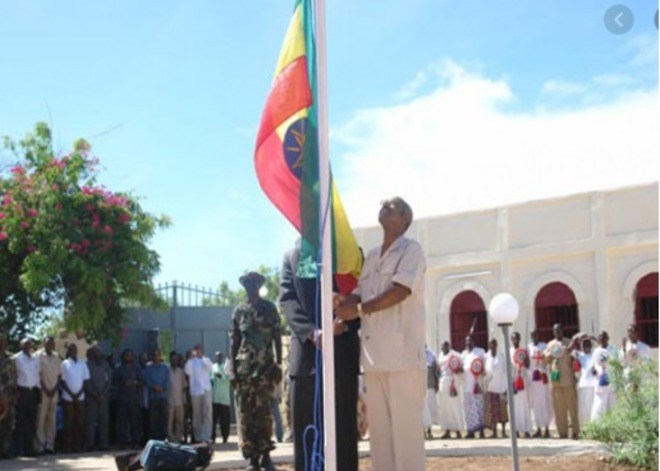
Tuesday November 5, 2024

FILE - Ethiopian Foreign Minister Seyoum Mesfin (right) and Somali Prime Minister Ali Mohamed Ghedi (left) hoist the Ethiopian flag during the inauguration of the newly renovated Ethiopian Embassy in Mogadishu on May 27, 2007.
Mogadishu (HOL) — Somalia will relocate the Ethiopian Embassy from its presidential palace, a decision reflecting the growing diplomatic rift fueled by Ethiopia's controversial port deal with Somaliland, which Somalia views as a direct challenge to its sovereignty.
The Ethiopian Embassy has been located in Villa Somalia since 2007, established after Ethiopia's military intervention in Mogadishu in December 2006. In a striking about-face, just weeks earlier, on October 17, Fiqi confirmed that the Ethiopian Embassy would remain in Villa Somalia despite growing concerns about its presence.
The MOU, signed earlier this year, allows Ethiopia to lease a port from Somaliland in exchange for potential recognition of the breakaway region's independence. This arrangement has sparked outrage within the Somali government, which perceives it as an attempt to legitimize Somaliland's long-standing claims of statehood.
On October 30, Somalia declared Ethiopian diplomat Ali Mohamed Adan persona non grata, citing his involvement in activities incompatible with his diplomatic role. Adan was ordered to leave the country within 72 hours, marking a continuation of Somalia's assertive stance against Ethiopian influence. This expulsion follows the earlier removal of Ethiopian Ambassador Muktar Mohamed Ware in April, highlighting the deteriorating trust between the two nations.
During a recent address to the United Nations General Assembly, Somali Prime Minister Hamza Abdi Barre urged the international community to condemn Ethiopia's actions. He accused Ethiopia of attempting to "annex parts of Somalia under the guise of securing sea access," emphasizing the gravity of the diplomatic crisis.
Despite attempts at mediation—mainly by Turkey—the negotiations have yielded little progress, with a planned third round of talks in September cancelled. Somalia's search for international support has led to strengthened ties with Eritrea and Egypt, which has historically opposed Ethiopia's expansive hydro dam projects on the Nile. In a strategic move, Egypt provided military aid to Somalia, marking a significant shift in regional alliances.
Ethiopia, eager for access to the Red Sea, is increasingly at odds with Somalia. Compounding the situation, Somalia has threatened to expel up to 10,000 Ethiopian troops stationed in the country by year's end. These forces, vital for peacekeeping and counter-terrorism efforts against al Shabaab, could leave a significant security vacuum if withdrawn.
Foreign Minister Ahmed Moalim Fiqi noted that the embassy's relocation will hinge on Somalia's overall stabilization. "The Ethiopian Embassy was established in the Presidential Palace with the prior approval of Somali leadership following Ethiopia's military intervention in 2007," Fiqi stated. "Once conditions allow, all foreign embassies will be directed to move to areas designated by the government."